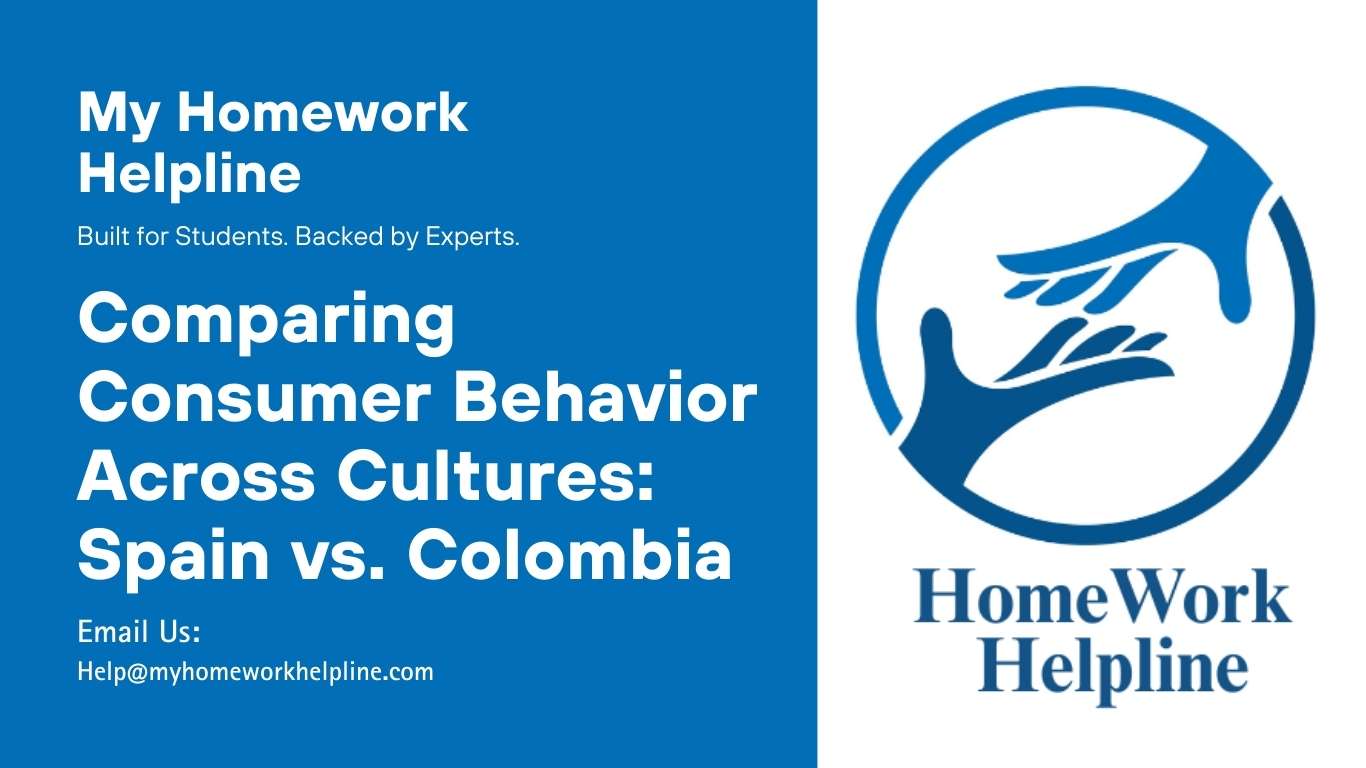Cross-Cultural Psychology Essay: Consumer Behavior in Spain and Colombia
Summary
The study by Peña-García et al. (2020) compares the purchasing behavior of people from a developed and individualistic country, Spain, and those from a developing collectivist country, Colombia. The study’s research objective was to identify the differences in the two groups’ consumer behavior by discussing the underlying motivational factors through an empirical study. The cultural groups compared were people from Spain and Colombia. The authors employed surveys to collect data from the two countries under investigation, and participants had to be born and raised in the particular countries. The authors addressed potential biases and limitations in their research design by first highlighting them and discussing how they managed them. For instance, the authors highlighted that they used estimates of the national culture of Hofstede to establish the difference between the consumers. Still, they could have also independently measured each participant’s culture to effectively compare the effect of cultural values on the studied variables’ relationships.
Discussion and Implications
Some differences were found between the two cultural groups’ consumer behavior. The study investigated participants’ self-efficacy to measure consumers’ perceived capability to purchase things online and found that Colombian consumers have less experience in online purchases due to the poor development of e-commerce in the country. On the other hand, the Spanish counterparts considered online purchases normal, originating from their functional elements such as personal preferences. The authors also found that a positive emotional response toward ease of purchasing stimulated Colombians to impulse buy, which is not true for Spanish consumers.
Understanding how culture influences consumer behavior can unlock valuable insights for academics and marketers alike. This study on Spanish and Colombian buying habits illustrates the power of cross-cultural psychology in real-world contexts. Enhance your knowledge and get expert assistance with in-depth academic work by visiting My Homework Helpline’s psychology homework service for tailored essays, research support, and professional guidance.
The study investigated the consumers’ level of indulgence because Hofstede identified that it affected the relationship between the ease of purchase and buying impulse (Heydari et al., 2021). Colombian consumers had a higher indulgence level, which pushed them towards instant gratification, encouraging impulse buying, which is not high in Spain due to low indulgence levels. Compared to their Spanish counterparts, Colombian consumers were found to associate purchases with social and collective processes; thus, they required a high level of perceived compatibility with online buying before purchasing. There was a significant difference between the two countries in the relationship between online purchase intention and behavior. In Colombia, consumers who intend to buy things online will likely do so. In Spain, even with the intention to purchase, consumers may not do so because of the country’s economic recession, which increases their awareness of spending habits.
These findings contribute to understanding cross-cultural psychology by highlighting how national culture shapes consumer behavior, reinforcing that cultural differences play a critical role in shaping people’s attitudes and behaviors. The study provides strong evidence on how different cultural factors affect consumer behaviors in online purchasing. By discussing consumers’ perceptions and cultures and their effects on consumer behavior, the study aids the understanding of cultural dynamics in psychological research and its applications in the real world.
The research findings challenged the traditional behavioral theories that emphasize a linear and generalizable behavior prediction of any group under study without considering the individuals’ place of birth and raising. By challenging these theories, the study underscored the need for researchers to consider cultural basis instead of making broad assumptions. Insights from the study can be applied to real-world contexts such as education and intercultural communication. In education, instructors can utilize the findings to demonstrate culture’s impact on consumer behavior. Additionally, educational institutions can use these findings to develop marketing courses to prepare students for a globalized marketplace. Marketing and advertising companies can also use these findings to create campaigns that relate to specific cultural groups, resulting in successful marketing campaigns.
Conclusion
The investigation by Peña-García et al. (2020) on the differences in consumer behavior between Spanish and Colombian consumers provides excellent insights into the influence of culture. Through surveys, the authors collected data to find multiple differences between the two groups’ online purchasing behavior as affected by culture. These findings help us understand cross-cultural psychology by highlighting how culture influences people’s behavior and actions. The study’s insights can help develop educational curricula for different courses and also be utilized by marketing professionals to reach their target audience in different cultural groups.
References
Heydari, A., Laroche, M., Paulin, M., & Richard, M.-O. (2021). Hofstede’s individual-level indulgence dimension: Scale development and validation. Journal of Retailing and Consumer Services, 62(1), 102640. https://doi.org/10.1016/j.jretconser.2021.102640
Peña-García, N., Gil-Saura, I., Rodríguez-Orejuela, A., & Siqueira-Junior, J. R. (2020). Purchase intention and purchase behavior online: A cross-cultural approach. Heliyon, 6(6), e04284. https://doi.org/10.1016/j.heliyon.2020.e04284

